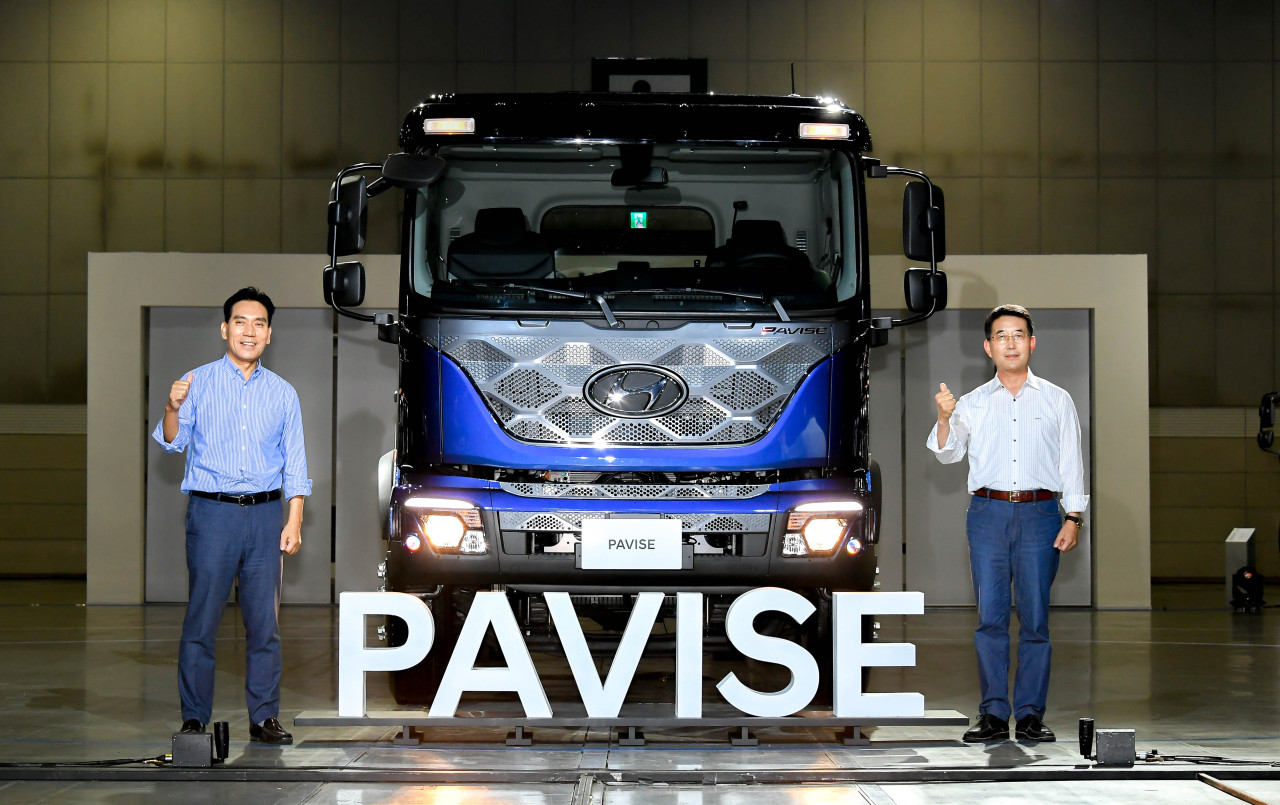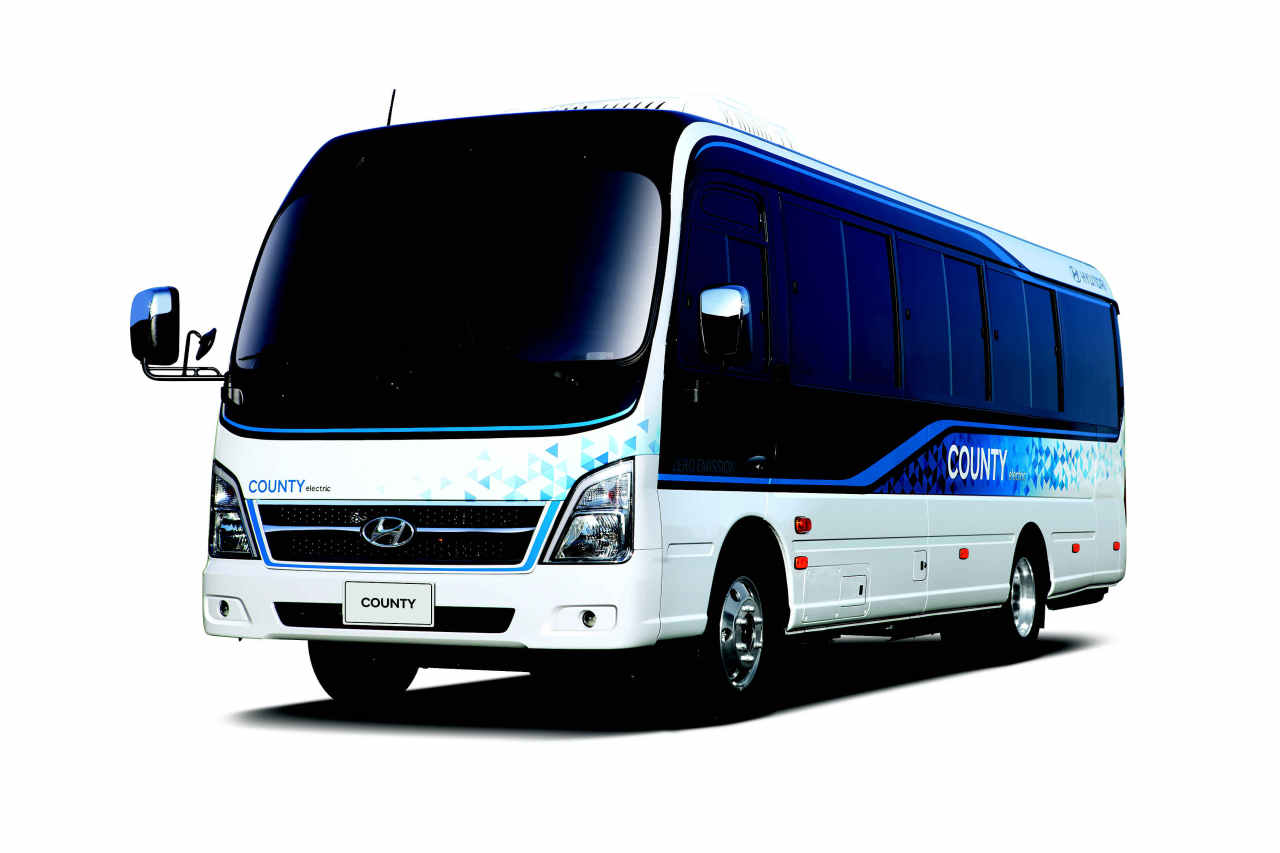Hyundai Motor introduces new commercial vehicles Pavise, County EV
Automaker aims to complete eco-friendly commercial vehicle lineup by 2025
By Kim Da-solPublished : Aug. 29, 2019 - 15:13
South Korean carmaker Hyundai Motor Group on Thursday unveiled two new mass-produced commercial vehicles, midsized truck Pavise and electric bus County EV, under a plan to complete its commercial vehicle lineups by 2025.
In 2017, Hyundai Motor has introduced its first-ever zero emission electric bus, called Elec City, and test-operated it during the 2018 Pyeongchang Winter Olympics.
According to Hyundai Motor, it plans to release 17 types of eco-friendly commercial vehicles by 2025, under its goal of contributing to the eco-friendly society and for customer satisfaction.
Pavise, the new-segment truck which combined the advantages of midsized and large trucks, has up to 13.5 metric tons of cargo capacity and 6.7 cubic meters of space around the front seat, with height of 1,595 millimeters, giving generous compared to other similar-sized trucks.
In 2017, Hyundai Motor has introduced its first-ever zero emission electric bus, called Elec City, and test-operated it during the 2018 Pyeongchang Winter Olympics.
According to Hyundai Motor, it plans to release 17 types of eco-friendly commercial vehicles by 2025, under its goal of contributing to the eco-friendly society and for customer satisfaction.
Pavise, the new-segment truck which combined the advantages of midsized and large trucks, has up to 13.5 metric tons of cargo capacity and 6.7 cubic meters of space around the front seat, with height of 1,595 millimeters, giving generous compared to other similar-sized trucks.

Pavis runs at a maximum of 325 horsepower through a 7-liter diesel engine. The carmaker said a fuel-efficiency calculating system has been added to the truck, which analyzes the driving pattern and suggests the most fuel-efficient driving mode in real time.
“Pavise aims to offer economic advantage and practicality. This will be a solution for customers who want spacious cargo loads but strong driving power,” said Lee In-Cheol, vice president and head of Commercial Vehicle Business Division at Hyundai Motors, during the Hyundai Truck & Bus Business fair at Kintex exhibition center in Ilsan, Gyeonggi Province.
The carmaker also introduced a new battery-powered midsized bus, the County EV, which has been revamped from the previous diesel model to have a body that is 60 centimeters longer.

County EV is attached with a 128kWh battery and can go up to 200 kilometers on a single charge. Fully charging the County EV takes 72 minutes.
The carmaker said such commercial vehicles will cater to different passenger needs, such as for long-distance traveling and transporting passengers in the downtown area.
Hyundai Motor said it would apply hydrogen fuel cell technology in midsized and large trucks and express buses, so that the vehicles can cover long distances. For small and midsized commercial vehicles that require less electricity, the company said it will apply electric battery systems to enhance charging efficiency.
“We aim to change the existing paradigm of large trucks here and launch a total of 10 hydrogen-powered trucks by December,” said Lee, adding that the automaker plans to sell 1,600 such trucks in Switzerland over the next 25 years.
In April, the Korean automaker formed a joint venture with Swiss-based H2 Energy to tap into Europe’s hydrogen mobility ecosystem with fuel cell trucks.
“After establishing business model in Swiss, we plan to expand the business into neighboring European countries, as well as introduce our commercial vehicles to public sectors to be used as public transportation or garbage trucks,” Lee added.
Hyundai Motor’s Hyundai Truck & Bus Business fair, which takes place in Ilsan Kintex, will be open to the public from Friday to Sunday.
By Kim Da-sol (ddd@heraldcorp.com)







![[Graphic News] More Koreans say they plan long-distance trips this year](http://res.heraldm.com/phpwas/restmb_idxmake.php?idx=644&simg=/content/image/2024/04/17/20240417050828_0.gif&u=)
![[KH Explains] Hyundai's full hybrid edge to pay off amid slow transition to pure EVs](http://res.heraldm.com/phpwas/restmb_idxmake.php?idx=644&simg=/content/image/2024/04/18/20240418050645_0.jpg&u=20240419100350)






![[From the Scene] Monks, Buddhists hail return of remains of Buddhas](http://res.heraldm.com/phpwas/restmb_idxmake.php?idx=652&simg=/content/image/2024/04/19/20240419050617_0.jpg&u=20240419175937)

![[KH Explains] Hyundai's full hybrid edge to pay off amid slow transition to pure EVs](http://res.heraldm.com/phpwas/restmb_idxmake.php?idx=652&simg=/content/image/2024/04/18/20240418050645_0.jpg&u=20240419100350)

![[Today’s K-pop] Illit drops debut single remix](http://res.heraldm.com/phpwas/restmb_idxmake.php?idx=642&simg=/content/image/2024/04/19/20240419050612_0.jpg&u=)